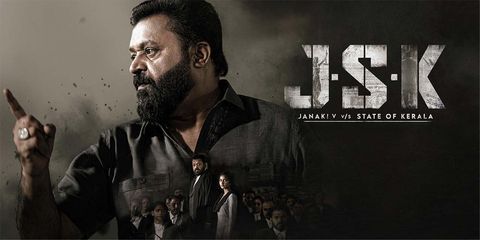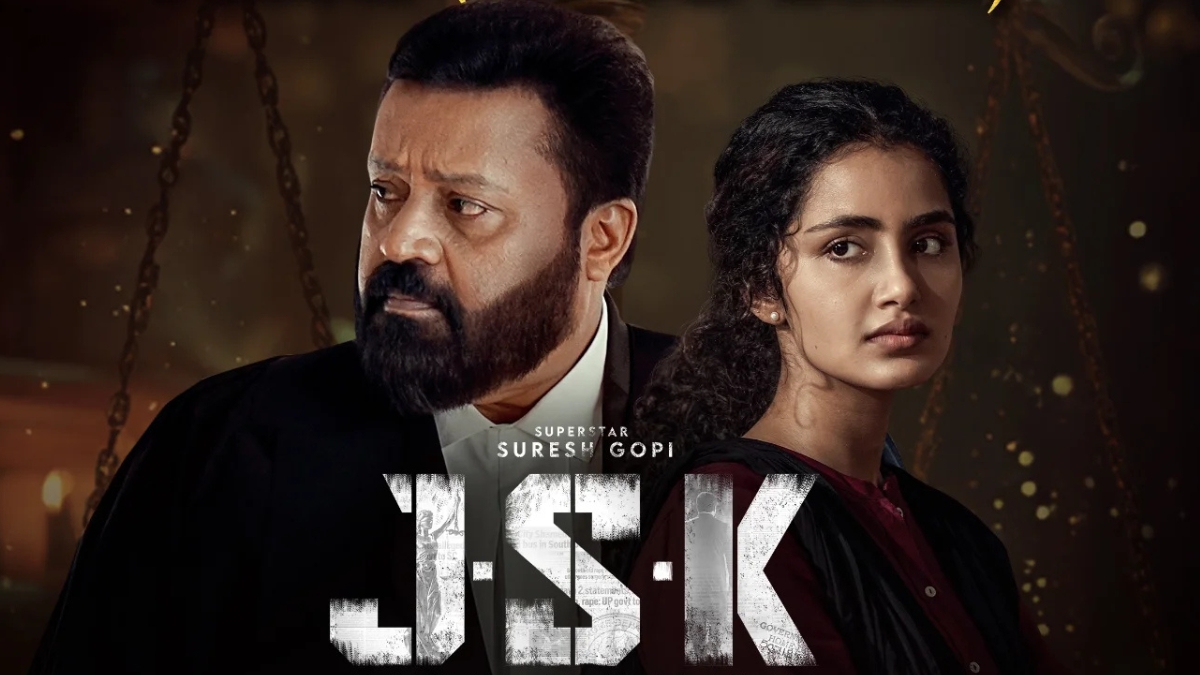The Malayalam legal drama Janaki V v/s State of Kerala has finally broken free from weeks of controversy, courtroom battles, and censorship roadblocks to secure its theatrical release on July 17, 2025. Starring Suresh Gopi and Anupama Parameswaran, and directed by Pravin Narayanan, the film has sparked a nationwide debate on creative freedom, religious sensitivity, and the limits of institutional censorship. What began as a cinematic portrayal of a woman’s quest for justice within Kerala’s judiciary spiraled into one of the year’s most debated cultural flashpoints, involving the Central Board of Film Certification (CBFC), the Kerala High Court, filmmakers, activists, and the film fraternity.
Below, we break down the nine biggest developments and heart-stopping moments that saw JSK—marketed with a hashtag and swelling public support—move from injunctions and protests to silver screen triumph.
1. Plot and Cast: A Powerful Legal Drama with Star Power
Janaki V v/s State of Kerala is a legal drama centered on Janaki Vidhyadharan (Anupama Parameswaran), a woman relentlessly seeking justice after a traumatic incident, with the story deeply enmeshed in Kerala’s judicial system. Veteran actor Suresh Gopi leads the cast as Advocate David Abel Donovan, while supporting roles feature an array of Malayalam film talent including Madhav Suresh, Shruthi Ramachandran, Divya Pillai, and Baiju Santhosh, bringing emotional heft to the courtroom battle. Directed by Pravin Narayanan and produced by Cosmos Entertainments, the film became one of 2025’s most anticipated releases.

2. Title, Character Name, and the CBFC Objection
Months before its intended release, JSK was engulfed in a storm after the CBFC refused to certify the film in its current form. The primary objection was over the lead character’s name, “Janaki”—a name closely associated with the Hindu goddess Sita.
The CBFC argued that naming a sexual assault survivor after a revered deity could be viewed as “sensitive and objectionable,” and initially demanded a staggering 96 edits, including a complete change of title and lead character’s name. The board also reportedly requested other modifications, which the filmmakers said were not even backed by a formal written rationale. This move triggered a debate on whether the CBFC was overstepping its remit by dictating story and character details that fall within creative liberties.
The intense scrutiny surrounding Janaki V, while challenging for the filmmakers, has elevated public consciousness about the broader issue of censorship and creative independence in Indian cinema. Directors, screenwriters, and producers now find themselves at the heart of a renewed nationwide conversation about how much influence certification boards should wield in storytelling decisions. Many industry professionals have begun demanding a structural overhaul of the CBFC, including suggestions that it transition from a censoring body to a certifying agency, respecting the maturity of Indian audiences and the autonomy of artists in a democratic nation.
At the same time, the film’s trajectory has reignited interest in how women are portrayed in mainstream cinema, especially in cases involving legal proceedings, trauma, and resilience. Janaki V, according to early reviews from critics and preview screenings, does not merely use the courtroom as a dramatic setting but rather seeks to unpack the emotional, social, and cultural complexities of a woman’s battle within the legal system. This layered narrative approach—unusual in male-dominated legal dramas—is seen as a step forward for the representation of female protagonists in Indian film, and could inspire a new wave of socially grounded stories with strong women leads.
Meanwhile, the emotional impact of the controversy continues to be felt by the cast and crew, who stood by the project despite mounting pressure. In multiple interviews, lead actor Anupama Parameswaran described the experience as “one of the toughest and most meaningful of my life,” adding that Janaki’s journey mirrored the team’s own real-life battle for justice. Suresh Gopi, known for his dynamic legal roles, called the delay “a moral fight, not just a professional one,” stressing that the film’s message must not be overshadowed by the noise around it. Their personal investments in the story have added authenticity and emotional weight to the film’s already compelling characters.
As audiences now pour into theatres and early online reviews trend heavily in the film’s favor, Janaki V v/s State of Kerala seems poised to achieve not just critical and commercial success, but cultural significance. It will likely be remembered for more than its performances or plot; it may be looked back on as a landmark moment in the dialogue between art and authority, between creators and censors. In the months that follow, its legacy may stretch beyond the screen—affecting lobbying reforms, encouraging legal protections for artists, and mobilizing viewers to see cinema not just as entertainment, but as a powerful tool for conversation and change.
3. Industry and Political Backlash: Creative Freedom in Focus
The CBFC’s stance led to immediate protests from film industry workers, including FEFKA, the Kerala Film Producers Association, and the actors’ federation AMMA. On June 30, 2025, a symbolic protest outside the CBFC’s Thiruvananthapuram office drew attention: participants dumped scissors—icons of censorship—into bins, held placards defending creative rights, and called for an end to arbitrary interference in filmmaking. Directors, writers, and actors publicly expressed dismay, fearing the ruling would set a precedent affecting all Indian cinema, especially smaller, risk-taking projects.
Politicians also joined the fray, with Kerala’s Minister for Cultural Affairs, Saji Cherian, terming the CBFC’s reported demands “unacceptable” and voicing concern about freedom of expression. Influential voices described the situation as reminiscent of previous censorship chapters in India, warning against a climate where art is forced to yield to religious or political sentiments.

4. The Legal Battle: Kerala High Court Intervenes
With no compromise from the CBFC and a rapidly mounting public campaign, the filmmakers approached the Kerala High Court. The judiciary questioned if the CBFC possessed the legal authority to object to names and storylines, referencing popular Indian films like Seeta Aur Geeta and Ram Lakhan as examples where mythological names were used without issue. Justice N. Nagaresh demanded a detailed affidavit from the CBFC, seeking a documented explanation for the board’s stance. The Court also arranged for a judicial review screening of the film and scheduled accelerated hearings to beat the project’s July release window.
5. Compromise and Settlement: From 96 Cuts to 2 Minor Changes
After several rounds of negotiation and judicial prodding, the stalemate receded during the July 9, 2025 hearing. Rather than the original 96 demanded edits, a settlement was achieved in open court. The CBFC, filmmakers, and the bench agreed to the following: in two crucial courtroom scenes, the character’s name “Janaki” would be muted; and the film’s title was to be revised from Janaki v/s State of Kerala to Janaki V v/s State of Kerala, representing the protagonist’s full name, Janaki Vidhyadharan.
The filmmakers accepted these limited changes in the interest of release, expressing concern but ultimately prioritizing the urgent need to bring the film to audiences without more damaging modifications. The High Court directed the CBFC to certify the film within three days.
6. Social Media and Public Mobilization: Hashtag Activism at Its Peak
Throughout the controversy, social media was ablaze with hashtags like #JusticeForJanaki and #LetJSKRelease. Twitter, Instagram, and Malayalam cinema forums saw actors, critics, writers, and lay public weighing in on what they viewed as a test case for artistic freedom. Citizen petitions, trending threads, parody posters, and creative memes spread everywhere, keeping the issue in national discussion for weeks. The slogan “Behind every delay… have a truth worth fighting for. And in the end, that truth shall always prevail!” became a rallying cry for the team and their supporters.
7. CBFC Certification and New Release Date
With legal and regulatory knots untangled, the CBFC granted a U/A certificate, enabling the movie’s theatrical release. The production team quickly locked July 17, 2025, as the new release date, making it one of the most high-profile openings of the season. Film lovers are eager to see what message the legal drama ultimately delivers and how its portrayal of women’s rights, justice, and the court system reflects on contemporary issues in Kerala and beyond.

8. Broader Implications: What the JSK Saga Means for Indian Cinema
The Janaki V v/s State of Kerala ordeal has set new contours for the debate around creative freedom in Indian filmmaking. The dispute, framed around something as seemingly minor as a character’s name, highlighted regulatory ambiguities and the risks of subjectivity in censorship. Industry experts and legal commentators believe this case may influence future court rulings about CBFC’s mandate and offer new grounds for challenging content restrictions that lack documented rationale or overstep statutory guidelines.
Advocates for stronger due process in film certification see JSK’s victory—not just in winning release, but in rallying cross-party and cross-industry support—as a positive sign for evolving Indian cinematic culture. Filmmakers and writers hope that more precise and transparent frameworks will follow, so that future controversies can be averted or resolved more rationally.
9. Anticipation and Box Office Prospects
Now, as Janaki V v/s State of Kerala finally heads to theaters, the buzz has only amplified. Industry trackers are eyeing opening day box office figures to see if the film can surpass records set by recent Malayalam hits, especially those starring Suresh Gopi post-pandemic. For Anupama Parameswaran, the role is expected to be a career-defining turn, and cinema chains in Kerala and major metros are scheduling special screenings.
With the drama around its release nearly as engrossing as the film itself, Janaki V v/s State of Kerala looks primed not just to dominate weekend collections, but to remain a touchstone in conversations about art, rights, and regulation for months to come.
Conclusion
The twisting, emotional journey of Janaki V v/s State of Kerala from censor board deadlock to High Court mediation, street protests to viral social media campaigns, underscores the complexity of creativity in modern India. In the end, the film’s survival—with its message and integrity mostly intact—stands as a testament to collective action, dialogue, and legal recourse in the face of arbitrary censorship. As audiences finally experience JSK on screen, the story behind its release may well inspire more voices—onscreen and off—to stand up for the right to tell bold, challenging stories that reflect the evolving India of 2025.
Follow: Janaki V
Also Read: Legendary Kannada Cinema Icon B. Saroja Devi Dies at 87: 7 Decades of Unmatched Grace and Glory

